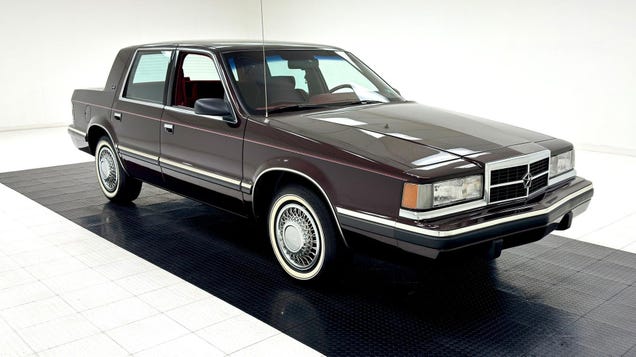The Resurgence of Classic Cars: Why Vintage Models Are Commanding High Prices
The automotive market is witnessing a fascinating trend: decades-old vehicles, often with remarkably low mileage, are fetching prices that defy conventional expectations. This phenomenon is not limited to high-end classics but extends to everyday models that once filled the streets. Understanding the reasons behind this surge in value can provide insights for both car enthusiasts and potential buyers.
The Allure of Low Mileage Classics
One of the most striking aspects of this trend is the emergence of vintage cars with minimal mileage. For instance, a 1993 Dodge Dynasty recently appeared on the market, boasting an astonishingly low odometer reading. Such vehicles, often preserved in pristine condition, evoke nostalgia and represent a bygone era of automotive design and engineering. Collectors and enthusiasts are drawn to these cars not just for their rarity but also for the stories they tell about the automotive culture of their time.
Recent studies indicate that the classic car market has seen a significant uptick in interest, particularly among younger buyers who are increasingly looking for unique vehicles that stand out from the modern crowd. According to a report from the Classic Car Club of America, the number of transactions involving vehicles over 20 years old has increased by nearly 30% in the past five years. This shift highlights a growing appreciation for the craftsmanship and character of older models.
Factors Driving Up Prices
Several factors contribute to the inflated prices of these vintage vehicles. First, the scarcity of well-maintained examples plays a crucial role. Many cars from the 1990s and earlier were driven extensively and subsequently scrapped or neglected. Those that remain in good condition are becoming increasingly rare, leading to heightened demand.
Moreover, the rise of online auction platforms like Bring a Trailer and Cars & Bids has transformed how classic cars are bought and sold. These platforms provide a global marketplace where buyers can easily find and bid on vehicles that pique their interest. The competitive nature of online bidding often drives prices higher, as collectors are willing to pay a premium for a car that meets their criteria.
The Emotional Connection to Vintage Vehicles
Beyond the financial aspects, there is an emotional connection that many buyers feel toward vintage cars. For some, these vehicles represent cherished memories of their youth or a connection to family history. The nostalgia associated with classic cars can be a powerful motivator, leading individuals to invest in vehicles that resonate with their personal stories.
For example, a buyer might be willing to pay a premium for a 1993 Dodge Dynasty because it reminds them of their first car or a family road trip. This emotional investment can significantly influence market dynamics, as buyers prioritize personal significance over rational financial considerations.
Navigating the Market as a Buyer
For those interested in entering the classic car market, understanding the nuances of pricing and condition is essential. Here are some actionable insights for potential buyers:
1. **Research Thoroughly**: Before making a purchase, research the specific model you are interested in. Understand its historical significance, common issues, and market value. Websites dedicated to classic cars often provide valuable insights and price guides.
2. **Inspect Before You Buy**: Always conduct a thorough inspection of the vehicle. Look for signs of rust, mechanical issues, and overall condition. If possible, enlist the help of a knowledgeable mechanic or a classic car expert to assess the vehicle.
3. **Consider Future Value**: While it’s tempting to buy based on emotional appeal, consider the potential for future appreciation. Models with a strong enthusiast following or limited production numbers are more likely to retain or increase their value over time.
4. **Join Enthusiast Communities**: Engaging with classic car clubs or online forums can provide valuable information and networking opportunities. These communities often share insights on market trends, restoration tips, and upcoming events.
The Future of Classic Cars
As the automotive landscape continues to evolve, the classic car market is likely to maintain its appeal. With electric vehicles gaining traction and modern cars becoming increasingly homogenized, vintage models offer a unique alternative that celebrates individuality and heritage. The trend of low-mileage classics commanding high prices is not just a fleeting moment; it reflects a broader cultural shift towards valuing authenticity and nostalgia in a rapidly changing world.
In summary, the current fascination with vintage cars, particularly those with low mileage, is driven by a combination of rarity, emotional connection, and market dynamics. For enthusiasts and collectors, this presents both opportunities and challenges as they navigate a vibrant and evolving marketplace.

